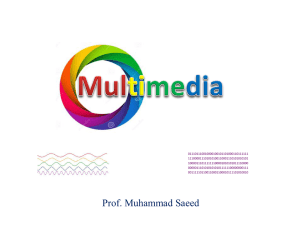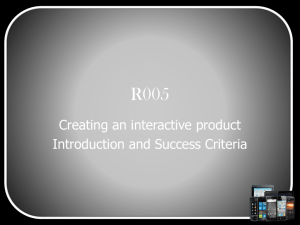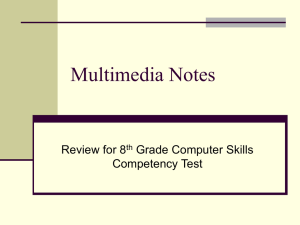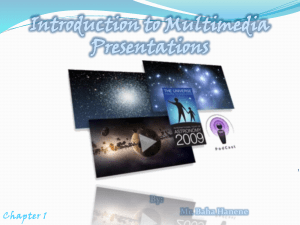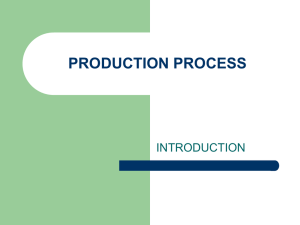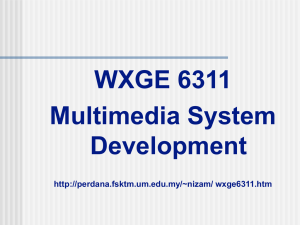ISS_MM_Theatres
advertisement
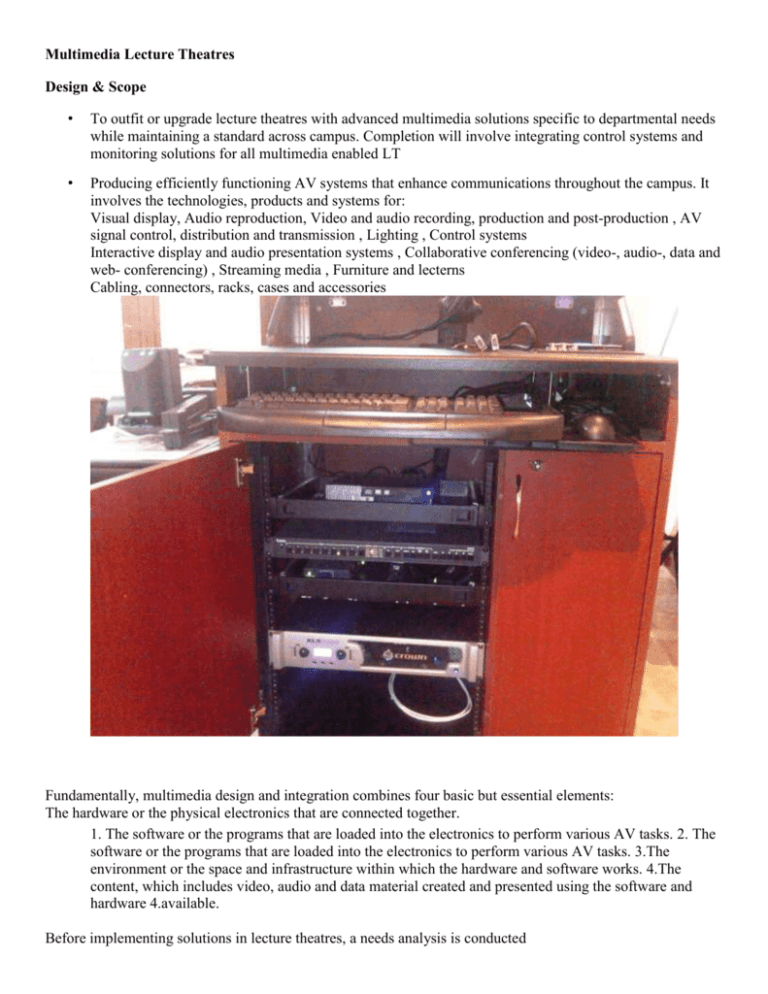
Multimedia Lecture Theatres Design & Scope • To outfit or upgrade lecture theatres with advanced multimedia solutions specific to departmental needs while maintaining a standard across campus. Completion will involve integrating control systems and monitoring solutions for all multimedia enabled LT • Producing efficiently functioning AV systems that enhance communications throughout the campus. It involves the technologies, products and systems for: Visual display, Audio reproduction, Video and audio recording, production and post-production , AV signal control, distribution and transmission , Lighting , Control systems Interactive display and audio presentation systems , Collaborative conferencing (video-, audio-, data and web- conferencing) , Streaming media , Furniture and lecterns Cabling, connectors, racks, cases and accessories Fundamentally, multimedia design and integration combines four basic but essential elements: The hardware or the physical electronics that are connected together. 1. The software or the programs that are loaded into the electronics to perform various AV tasks. 2. The software or the programs that are loaded into the electronics to perform various AV tasks. 3.The environment or the space and infrastructure within which the hardware and software works. 4.The content, which includes video, audio and data material created and presented using the software and hardware 4.available. Before implementing solutions in lecture theatres, a needs analysis is conducted What is Needs Analysis? Formal needs analysis consists of identifying what activities the end-users i.e. the lecturers etc. need to perform, then developing the functional descriptions of the systems that support those needs. CHALLENGES • • • • Culture of Teaching Security - RMS / Podiums (Lecterns) / Access Control Distance education Signal Management - Taking signals from any room and redirecting it to any other space • Areas in need of improvement – retrofitting existing infrastructure Colleges and Universities are enhancing their use of high-tech audio/video technology for communications and instructional applications. Student learning patterns are changing, and in order to facilitate their interactive nature, colleges and universities have to adapt and provide solutions over this capacity. By harnessing the power of computer aided systems, Lecture Theatres are controlled from a single point of control, allowing lectures to begin and transition with ease. Digital Information is presented and transferred to allow full scale interaction between the student and lesson; and, lectures are streamed over broadband for wide area learning. The UWI MONA Campus will be no different as we aim to achieve the best for our students and our lecturers, and setting the standard for interactive learning in Jamaica. Transformation plan for Lecture Theatres and Tutorial Rooms The plan is broken down based on: 1) Lecture Theatre Control 2) Interactive Teaching & Distance Learning 3) Multimedia Equipment 4) Multimedia Equipment Placement and Security 5) Theatre profiles 6) Installation and Timeline 1. LECTURE THEATRE CONTROL Improve the efficiency of teaching by using touch panel/keypad control systems to eliminate multiple control points that are currently being used. The lecture theatres are currently using multiple control interfaces for multiple devices in the room. This means, a lecturer, upon entering the classroom has to use different power modules before starting their class. For an average multimedia presentation a lecturer would have to turn on the projector, motorize the projector screen, turn on and log on to the computer, adjust the lights, turn on the microphone and turn on the audio system using different control interfaces before they being their lecture. The process is the same for an external laptop, VCR and DVD players.SOLUTION A control system is a signal routing solution that has built in modules to support several components. It provides high performance signal processing without the need for separate components / control interfaces. By using a control system, we would eliminate using multiple control points and interfaces with a single touch panel control center. By having one point of control, lectures will not only save time, but save energy caused by frustration and confusion. External Connection Interface Plate on Podium or walls An interface plate is normally provided for laptop, usb, s-video and other formats for presenting from external AV devices. In addition to this, the presentation medium is sometimes fitted with network connections, power and gooseneck microphones Figure 1 - Control Keypad Monitoring: A multi-user resource management program offering global room scheduling, monitoring, controlling, and reporting of AV resources and environmental systems will be needed for full scale maintenance and security of all major equipment connected to the control system. 2. INTERACTIVE TEACHING (SMART) In order to expand on the efficiency of teaching, solutions must be put in place to meet the demand for a more a interactive classroom. This solution includes the use of both hardware and software in a more collaborative teaching effort. INTERACTIVE WHITE BOARD: The SMART Board interactive whiteboard is a touch-sensitive display that connects to a computer and digital projector. Using a finger, you can control computer applications, write notes, pull up charts and images, search Internet, play videos and save your work. INTERACTIVE PEN DISPLAY The Interactive Pen Display enables the user to effortlessly control any presentation and bring it to life. Write over slides in digital ink, save your notes, access any website or multimedia file and project your work onto a large screen to give your audience a truly interactive experience. This would be used in rooms that are too large to facilitate the interactive white board. WIRELESS INTERACTIVE SLATE With the AirLiner slate you can interact wirelessly with your SMART Board interactive whiteboard or Sympodium interactive pen display from 52 feet (16 m) away. The battery-free tethered pen lets you control any software application, Internet, play videos and save your work,teach from anywhere and allows students to interact with information from their seats. Video Conferencing/ Web Casting / Distance Learning The benefits of leveraging telepresence and video are clear. The need for extended classrooms have increased dramatically, and more classrooms are now being design with this in mind. Solutions must have the ability to not only stream live video, but stream live content and also make it available on demand. Solutions must also provide the ability for live interaction with teacher / student at any given time. Video Conference System: Achieve cost avoidance and generate revenue � Save resources by reducing travel while increasing revenue extended reach to alumni, businesses, and increasing student enrollment Rapidly transfer knowledge � Provide, staff and administration with the ability to collaborate and coordinate faster regardless of being geographically or time constrained Provide access to services � Meet mandated requirements and extend programs like outreach or student services to all locations with a virtual presence Extend course offerings � Expand degree and non-degree programs across campuses, to businesses or to secondary institutions while managing faculty shortages Enhance and share expertise � greatly extend the scope of your classroom or research activities by tapping globally into the field of experts, partners, and professionals Improve student learning outcomes and reduce attrition � Blend technologies to create an engaging learning environment through synchronous face-to-face and asynchronous collaboration Integrate with other learning tools � Easily integrate with leading learning management and course management systems, smart boards and multimedia content 3. MULTIMEDIA EQUIPMENT The control system mentioned, removed several of the components and interfaces currently used in the lecture theatre. Based on the profile of a room, additional equipment will be required. Listed below are the additional components 1) Computer Systems: By using Smart products we will eliminate the use of desktop monitors, as a result up to par Dell Desktops with at least 5 USP Ports and 2 GB’s of memory. 2) Document Cameras / Visual Presenters 3) Projectors 4) Video Conferencing Solutions 5) Microphone input sources 6) Amplifiers & Speakers 7) Motorized Projector Screen / Pull Down Screen for Small room scenarios 8) Podium/Lectern/Wall interface Plates with 2 USB / 2 Data / VGA / Composite & S-Video / RCA / 3.5mm 15) Large Format LCD / Plasma Screen 16) Additional AV Cables 17) Video/Audio Switcher – accepting multiformat signals and converting for output to projection system 18) Media Distribution amplifiers – routing signals to different displays, 19) Webcasting hardware and PTZ cameras It is the intention of MITS to improve Multimedia teaching spaces by implementing relevant technologies and infrastructure for effective content delivery. A significant part of content delivery involves the “Multimedia Podium’ as this is the infrastructure that houses various technologies that allow the presenter (Lecturer) to reach out to the audience. Modern Multimedia Podia must have relevant tools that allow the user to experience smooth content delivery to the audience.

